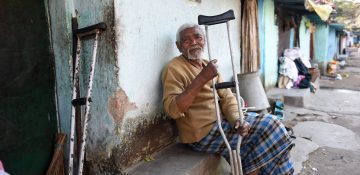Reducing stigma and improving mental wellbeing and social participation for people affected by lymphatic filariasis and leprosy in India
COR-NTD funded a study conducted by NLR to reduce stigma and improve mental wellbeing and social participation amongst men and women affected/disabled by lymphatic filariasis and leprosy in the districts of Jaunpur and Bokaro in India.

India accounts for more than 58% of the global leprosy cases and 40% of the global lymphatic filariasis cases as reported by National Leprosy Eradication Program (NLEP) & National Vector Borne Disease Control Programme (NVBDCP), Government of India. Leprosy is a communicable disease with the ability to cause permanent and progressive physical & visual disability. Lymphatic filariasis (LF) impairs the lymphatic system and can lead to bizarre swelling of body parts, and causes tremendous social stigma. The development (and worsening) of ulcers, wounds, cracks, injuries, contractures and vision impairments not only affects the quality of health but also the quality of life as it contributes to intense rejection and social discrimination of persons affected by leprosy and LF.
The current research study is intended to reduce stigma and improve mental wellbeing and social participation amongst men and women affected/disabled by lymphatic filariasis and leprosy in the districts of Jaunpur and Bokaro in India. The study will endeavor to answer “To what extent does stigma affect social participation and mental wellbeing among men and women affected/disabled by lymphatic filariasis or leprosy in Jaunpur in Uttar Pradesh and Bokaro in Jharkhand?”. Besides investigating the impact of stigma on social participation and mental wellbeing of people affected/disabled by LF and leprosy, this study will also try to develop and assess an NTD-adjusted version of Psychological First Aid for use as peer-counselling method to reduce stigma and improve mental wellbeing and social participation among persons with LF or leprosy-related disabilitie. The so-callse BPS-N (Basic Psychological Support – NTDs) has been developed and is now being tested through a proof of concept study.
The project is funded by The Coalition for Operational Research on Neglected Tropical Diseases (COR-NTD)